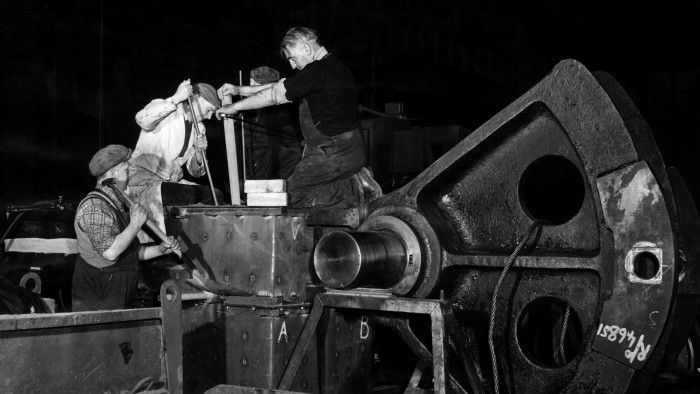Unlock the Editor’s Digest for free
Roula Khalaf, Editor of the FT, selects her favourite stories in this weekly newsletter.
The writer is professor of economic history at Sussex University and a research fellow at CAGE and CEPR. Tim Leunig, Nesta chief economist, also contributed
Every economist, and certainly every politician, has their own theory of growth. Thankfully, history provides us with strong evidence as to what works and, even more critically, what doesn’t.
The 1930s taught us that protectionism favours no one. But this is not the only important lesson we can draw from that decade, and from those that follow. The period from the 1930s to the 1950s saw a wholesale retreat from laissez-faire economics in Britain, caused by the apparent failure of capitalism in the Great Depression and by the apparent success of the planned economy during the second world war. As well as restrictions on trade, the UK government also imposed restrictions on competition at home.
This took two main forms. The first was the creation of “national champions”. The aim was to create domestic companies that could use their market power to raise prices, make profits and invest in the innovations of the future. Mergers were not assessed for their effect on competition or consumers — quite the reverse. Governments encouraged the creation of larger, more monopolistic companies.
The second was the creation of managed markets. Companies were allowed to set prices jointly, and agree to restrict competition. These restrictions could be enforced in law.
By the 1950s more than half of all manufactured output was produced by companies that were part of formal cartels. Some industries, such as ship building and steel, were almost 100 per cent cartelised. That this approach would fail was predicted by serious economists at the time. The future Nobel Prize winner Sir John Hicks remarked in 1935 that “the best of all monopoly profits is a quiet life”. And so it proved. Companies used their monopoly status to avoid tough decisions. The adoption of new technologies lagged behind other nations, particularly the US, but increasingly, Britain fell behind Europe as well. Working practices did not keep up with global standards either. In the short run both management and workers enjoyed their quiet lives, but in the medium term they immiserated themselves and the nation.
Having fallen behind our European neighbours, Britain only began to catch up after 1979, when the Thatcher government took domestic competition seriously. Competition policy improved, and foreign companies came here to fight for market share. The 1990s were also a period of greater international competition, with the deepening of the EU single market after 1992, and the rise of China and other east Asian nations. The combination of greater domestic competitive pressure, allied with greater competition from abroad, led Britain to close the productivity gap markedly with its European neighbours, raising our living standards substantially.
More recently, the Conservative party took us out of Europe. Since then trade rates with the EU have fallen substantially. The reduction in both exports and imports means that fewer UK companies are kept on their toes by having to compete with the best in the world. The quiet life awaits, with all the dismal consequences that follow.
The reduction in trade makes it more important than ever that domestic levels of competition are kept high. In that context it is even more surprising that the current government seems to be intent on doing the reverse. The replacement of Marcus Bokkerink with Doug Gurr as head of the Competition and Markets Authority, on the grounds that the former was too committed to competition, is the reverse of what the UK needs if it wants to be a growing, high-productivity, economy. Similarly, the government’s now rejected attempt to protect the banks in the car loan scandal does not bode well.
Competition is the strongest spur to management, and the surest route to prosperity. We need the government to remember that, because the alternative is that our country will continue to stagnate.




